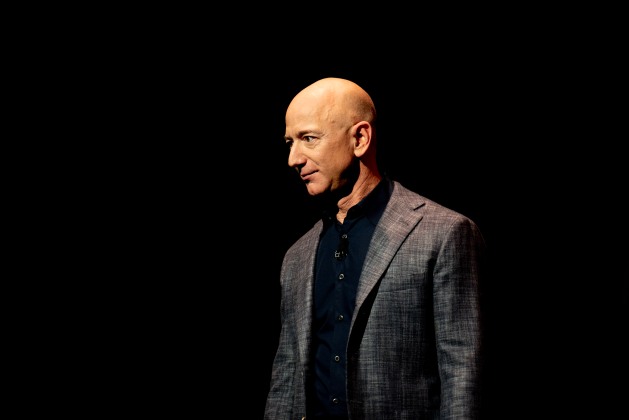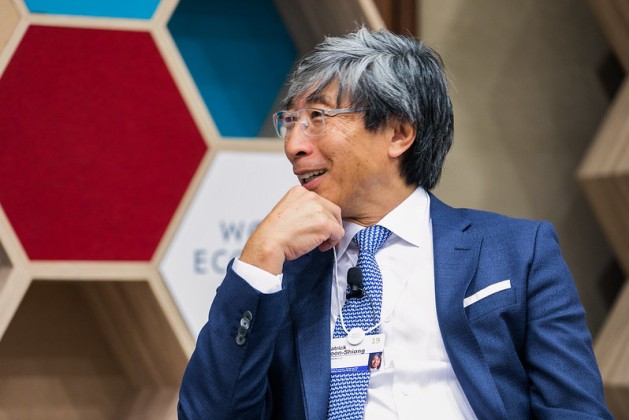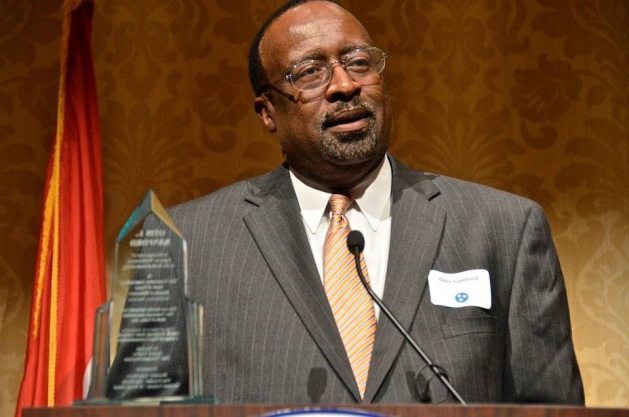
Jeff Bezos. Photo (cc) 2019 by Daniel Oberhaus.
Should one of the world’s most influential billionaires own one of our most influential news organizations? That’s the question Dan Froomkin asks in the Columbia Journalism Review about Jeff Bezos, the founder of Amazon and the owner of The Washington Post. It’s an important article, and you should read it. But I have some reservations, which I detail below.
Headlined “The Washington Post Has a Bezos Problem,” Froomkin’s piece argues that the situation has changed since the early years of Bezos’ ownership, when the Post’s news and editorial pages were edited by Graham-era holdovers (Marty Baron and Fred Hiatt, respectively) and the paper returned to glory with deep investigative reporting on Donald Trump, both before and after the 2016 election.
Please consider becoming a member of this free source of news and commentary for just $5 a month. Click here to sign up.
Now, Froomkin writes, Bezos tweets critically about President Biden’s economic policies while the Post’s news coverage, whether coincidentally or not, appears to track with those tweets. Bezos also had a hand in hiring Baron’s successor as executive editor, former Associated Press executive editor Sally Buzbee, and editorial page editor David Shipley, a Bloomberg journalist who was hired following Hiatt’s sudden death. Froomkin writes:
Throughout history, newspapers have frequently been owned by moguls — and readers were at times appropriately apprehensive. In this era, Rupert Murdoch has created a powerful media empire, which includes Fox News and The Wall Street Journal, and his influence has been considerable.
But Bezos is in a different league even from Murdoch. The world has never seen wealth like this before, and it has never been so interconnected.
As I said, Froomkin makes some good points. We ought to be concerned about that kind of power concentrated in one of our leading news outlets. He quotes Edward Wasserman, a media ethicist at the Graduate School of Journalism at Berkeley, as saying that Bezo’s dual role as a master of the universe and as the Post’s owner as being “not compatible with the kind of independence we normally associate with independent news organizations.”
But I think we have to dig a little deeper. When I was reporting on the Post for my 2018 book “The Return of the Moguls,” I could find no evidence that Bezos interfered with the paper’s news coverage or even its opinion operations. (The latter would be perfectly acceptable for an owner, and in fact John and Linda Henry are known to have their say in the opinion pages of The Boston Globe.) Nor did Froomkin find any evidence to the contrary.
What I have found as a reader of the Post is that though the paper will offer tough coverage of Amazon when warranted, it hasn’t gone out of its way to do any in-depth enterprise reporting on Amazon, as The New York Times has. As I told Froomkin, “I suppose nothing would answer the question more thoroughly than if they suddenly unveiled a real ass-kicking story about Amazon — a real in-depth piece of enterprise reporting that reflected pretty harshly on their owner.”
But every newspaper owner has conflicts of interest. Before Bezos bought the Post and took it private, it was a publicly traded company owner by the Graham family, who also owned the Kaplan testing company. The Grahams were often criticized for the Post’s soft coverage of the education testing industry. Of course, John Henry is the principal owner of the Red Sox. Glen Taylor, who revived the Star Tribune of Minneapolis, is a sports owner as well. Patrick Soon-Shiong, who owns the Los Angeles Times, is a pharmaceutical entrepreneur. And on and on.
All of these billionaires have improved their papers at a time when corporate chain owners and hedge funds like Gannett and Alden Global Capital are hollowing out their newspapers by the hundreds. Soon-Shiong’s ownership of the LA Times has been controversial, but he’s invested in the paper and he hired a fine newsroom leader, Kevin Merida, the most prominent Black editor in the country now that Dean Baquet has retired from the NY Times. Needless to say, none of these billionaires wields the sort of clout that Bezos does. But you have to ask: What is the alternative? Who is Dan Froomkin’s ideal owner?
In fact, I asked Froomkin that on Twitter. His answer: “A local foundation or a local philanthropist or a civic-minded billionaire or a union. Anything but the (near) richest guy in the world. This broken system is working for him just great.”
Hmmm. Certainly the Henrys, Taylor and Soon-Shiong qualify as civic-minded billionaires — maybe even as local philanthropists. Presumably the only thing that rules out Bezos is scale. I’m not familiar with any unions that own newspapers, although it’s a great idea and there are some historical examples.
A local foundation? There are a few. The Philadelphia Inquirer and the Tampa Bay Times are for-profit newspapers owned by nonprofit foundations — the Lenfest Institute and the Poynter Institute, respectively. But that came about because the billionaires who owned those papers donated them. The Salt Lake Tribune is a nonprofit that was donated by yet another billionaire.
Frankly, I think the biggest worry about the Post is that Bezos might be losing interest, which — if you read between the lines of a recent NY Times story — is a real concern. If that’s the case, would Bezos donate the Post to a foundation, as Gerry Lenfest did in Philadelphia and Nelson Poynter did in Tampa Bay/St. Petersburg? I’d like to think he wouldn’t preside over the revival of The Washington Post only to turn around and deliver it into the arms of Alden Global Capital. But who knows?
It could well be that the only thing worse than the Post under Bezos is the Post under a different owner.









